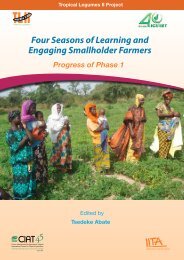Four Seasons of Learning and Engaging Smallholder Farmers - icrisat
Four Seasons of Learning and Engaging Smallholder Farmers - icrisat
Four Seasons of Learning and Engaging Smallholder Farmers - icrisat
You also want an ePaper? Increase the reach of your titles
YUMPU automatically turns print PDFs into web optimized ePapers that Google loves.
Seed production was monitored throughout the project cycle. NARS kept careful records <strong>of</strong> initial<br />
Foundation/Certified Seed produced <strong>and</strong> distributed to partners, while selected partners in decentralized<br />
zones kept records <strong>of</strong> farmer multipliers, farmers receiving seed, <strong>and</strong> multiplication rates by region.<br />
Seed delivery mechanisms<br />
The use <strong>of</strong> small packs is based on the field insights that farmers want access to new varieties, <strong>and</strong> that<br />
some also are willing to pay for Certified Seed at affordable sizes. Seed simply has to be marketed in<br />
affordable sizes, in places which are easily accessible to farmers, <strong>and</strong> from vendors that farmers trust (or<br />
who may be held accountable to buyers). Available M+E data show that 3700 MT <strong>of</strong> seed has been sold in<br />
small packs across three countries. Of this amount, 226 MT was sold in Nigeria, 430 MT in Mozambique,<br />
<strong>and</strong> 44 MT in Kenya in small packs sealed in 2 kg, 5 kg <strong>and</strong> 10 kg sizes. At the beginning <strong>of</strong> TL II, NARS<br />
<strong>and</strong> NGOs considered that farmers only wanted large quantities, that is 50 kg <strong>and</strong> 20 kg packs.<br />
Progress in on-farm demonstrations<br />
Demonstration plots were established in all participating counties to popularize <strong>and</strong> showcase the<br />
performance <strong>of</strong> improved soybean varieties to large numbers <strong>of</strong> farmers.<br />
In Nigeria, 365 farmers (259 men <strong>and</strong> 107 women) successfully established on-farm soybean<br />
demonstration plots in the project areas <strong>of</strong> Borno, Benue, <strong>and</strong> Kaduna States. The average yields for<br />
the improved varieties ranged from 1753 in the Sudan zone to 2149 kg per ha in the Savanna zone<br />
compared, to average yield <strong>of</strong> 1553 kg per ha <strong>of</strong> the farmers’ variety. In 2010, 30 demonstration plots<br />
were established in Benue State. The average yield <strong>of</strong> the improved variety was 2181 kg per ha, compared<br />
to 1523 kg per ha <strong>of</strong> the farmers’ localvarieties. In Mozambique, a total <strong>of</strong> 430 demonstration plots<br />
were established while in Kenya, 44 demonstrations were established.<br />
Underst<strong>and</strong>ing <strong>and</strong> developing market-value chain<br />
Soybean seed supply chain <strong>and</strong> other form <strong>of</strong> value-addition has been carried out in all project<br />
countries <strong>and</strong> reports submitted. Market development for soybean <strong>and</strong> linkages has resulted in<br />
increased production <strong>and</strong> sales <strong>of</strong> soybean making significant contributions to improving livelihood<br />
<strong>and</strong> poverty reduction.<br />
Progress in market linkage<br />
In Nigeria, two seed companies <strong>and</strong> a seed cooperative are involved in producing <strong>and</strong> selling soybean<br />
seed. These are Premier Seeds Nigeria Ltd, Project Seed Co. Nigeria Ltd <strong>and</strong> Jirkur Seed Cooperative;<br />
these entities have been linked to each other.<br />
To ensure that seed producers have access to market outlet for the sales <strong>of</strong> their seed, seed farmers were<br />
linked to institutions that have the m<strong>and</strong>ate for the crop <strong>and</strong> other major seed companies. The linkage<br />
was aimed to encourage the seed producers to improve <strong>and</strong> exp<strong>and</strong> seed production as a result <strong>of</strong> the<br />
additional market outlets.<br />
In Nigeria, a total <strong>of</strong> 226 MT <strong>of</strong> Certified Seeds <strong>of</strong> different soybean varieties have been sold in different<br />
packs sizes over the last 3 seasons. Of this total, 100 MT was sold in small packs <strong>of</strong> 1, 2 <strong>and</strong> 10 kg pack<br />
to farmers. In Mozambique, 430 MT <strong>of</strong> soybean varieties packaged in small packs were sold through<br />
input dealer shops <strong>and</strong> cooperative stores. In Kenya, a total <strong>of</strong> 44MT <strong>of</strong> different soybean seed has been<br />
sold over the last 3 seasons.<br />
Progress in training farming communities<br />
A number <strong>of</strong> training activities were carried out in the project countries with respect to seed production<br />
technologies, PVS, field plot techniques, seed segregation <strong>and</strong> st<strong>and</strong>ard, storage processing <strong>and</strong><br />
Progress <strong>of</strong> Phase 1<br />
245

















